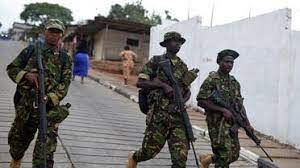APA-Freetown-(Sierra Leone) More than two decades after the guns fell silent in one of Africa’s most brutal civil conflicts, few would have given even a faint chance of exhorting the ghost of Sierra Leone’s violent past.
However, events of the past few days is sending jitters down the collective spine of this small nation of just 8.4 million people finding its feet in democracy and political pluralism.
The events of November 26, 2023 were reminiscent of the late 1990s when the resource-rich country was overran by rebels and left the doddering Sierra Leonean state almost crumbling under their advance.
The recent failed coup in Freetown had conjured up spectacularly tragic imageries when the bloodthirsty Revolutionary United Front (RUF) had entered the capital to a cacophony of gunfire and an apocalyptic trail of death and destruction in their wake.
Rebel soldiers in a bid to overthrow Julius Maada Bio raided the main Wilberforce Barracks and the central prisons along Pademba Road commandeering weapons and setting 2000 inmates free.
They were eventually beaten back by loyal troops.
After the smoke of battle had cleared, 21 people were dead, including 14 soldiers, three of the assailants, and four civilians, according to the authorities.
Some of the attackers are thought to be still at large and bounties have been put over their heads.
Although the armed insurrection has been swiftly put down, it has reopened old national scars and points to the precarious nature of the country’s shaky democratic stability, coming just months after Mr. Bio won a second term as president.
His detractors point to his lack of drive to improve the economy, a factor which drove thousands of Sierra Leoneans onto the streets last year to protest rising cost of living, leading to scores of deaths as anti-riot police clashed with the marauding protesters.
The tensions which attended to popular resentment being uncorked on the streets carried into the pre-election period.
Bio’s re-election in June barely masked this sometimes deep fractious political divisions in Sierra Leone that run along tribal lines which politicians on both sides of the political divide had done little or nothing to assuage.
While some of Bio’s opponents believe in the power of democracy to revise their fortunes at the polls on another day, other detractors are all too willing to use the barrel of the gun to have their way as the bloody attempted coup of Sunday November 26 showed.
The implications for the economy may also cause more resentment.
With the local tourism industry already dealt a body blow, the economic impact has been far from negligible as tourists canceled their trips to Sierra Leone in the wake of the unrest.
The government is conducting an investigation into the failed insurrection to determine the motive behind what officials call ‘an affront on democracy’.
However, observers say equally significant would be an honest interrogation of the sometimes non-political factors prompting opponents of the government to want to resort to violence to effect change at the top.
In an address to the nation President Julius Maada Bio suggested that his government would be preoccupied with strengthening the military, improving the security of government buildings.
He also spoke about addressing the underlying grievances that may have motivated the coup plotters but did not elaborate.
Optimists believe that Sierra Leone’s democracy has stood the test of time after more than 20 years and that this resilience will continue to defy subsequent assaults on it.
However, only time will tell whether Sierra Leone will be able to overcome similar challenges to its hard-earned peace and political stability.
ABJ/APA


